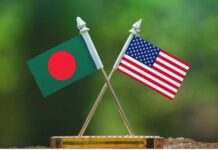Six major retailers, including Carrefour, Marks & Spencer and El Corte Inglés, announced on Tuesday that they would participate in a landmark plan to improve fire and building safety in Bangladesh, joining five European companies that signed onto the plan on Monday.
With only one American company joining — PVH, the parent company of Calvin Klein and Tommy Hilfiger — consumers, investors and labor groups are pressing Gap, Walmart and other American retailers and apparel companies to sign onto the effort. The plan will require participating companies to agree to rigorous inspection of the factories they use in Bangladesh and to help underwrite needed safety improvements at factories with violations.
Once numerous European companies began joining the plan on Monday — led by H&M, the Swedish company that is the largest purchaser of apparel from Bangladesh — a division has appeared between European and American companies about what needs to be done to respond to the April 24 factory building collapse in Bangladesh in which more than 1,100 workers died.
Walmart has maintained a distance from the collapse, even though Ether Tex, one of the factories in the collapsed Rana Plaza building, had listed Walmart as a customer on its Web site. Both Walmart and Ether Tex’s chairman have said that Walmart was not a customer at the time of the building collapse.
The Bangladesh Center for Worker Solidarity has provided The New York Times with photos of what it says are documents recovered in the Rana Plaza rubble that show that a Walmart contactor from Canada, Fame Jeans, was having jeans produced for Walmart at Ether Tex. One document, a purchase order dated May 12, 2012, calls for “dark blue wash,” “skinny fit” jeans to be delivered in the fall of 2012.
Another document, dated April 27, 2012, discusses pricing for five different jeans styles, with the F.O.B. prices ranging from $3.41 to $4.50 a pair.
Kevin Gardner, a Walmart spokesman, noted that the documents were from a year ago. “Our investigation of the Rana Plaza building site after the collapse revealed no evidence of authorized or unauthorized production at the time of the tragedy,” Mr. Gardner said. “If we learn of any unauthorized production, we will take appropriate action based upon our zero-tolerance policy on unauthorized subcontracting. We remain committed to promoting stronger safety measures in factories, and that work continues.”
Judy Gearhart, executive director of the International Labor Rights Forum, an advocacy group in Washington, said Walmart was improperly trying to distance itself from the building collapse.
“It’s another example of Walmart’s lack of ability to track the specifics of its supply chain,” she said. She called on Walmart to join a compensation fund for the victims of the Rana Plaza building collapse.
So far no American company has agreed to contribute to such a fund, while Loblaws of Canada, Primark of Britain, El Corte Inglés of Spain and three other European companies have agreed to participate.
Consumer and labor groups have focused more on persuading Gap rather than Walmart to join the Bangladesh factory safety plan. Gap has been the most vocal company in criticizing the plan, expressing concerns that overly litigious American lawyers could seize on the agreement to sue American companies on behalf of aggrieved factory workers in Bangladesh. Gap’s proposed changes would greatly limit any legal liability for any company that violated the plans.
In a statement, Gap said: “We’re pleased that an accord is within reach, and Gap Inc. is ready to sign on today with a modification to a single area — how disputes are resolved in the courts. This proposal is on the table right now with the parties involved. With this single change, this global, historic agreement can move forward with a group of all retailers, not just those based in Europe.”
Under Gap’s proposal, if a retailer is found to have violated the agreement, the only remedy would be public expulsion from the factory safety plan.
“The U.S. is quite litigious,” said Bill Chandler, a Gap spokesman. “We put forward specific proposals that we thought would bring other American retailers into the fold. We thought it would be a step forward and would turn it into a much more global agreement.”
The labor unions and advocacy groups that have negotiated with H&M; Inditex, the Spanish company that owns the Zara chain; and other companies that have signed the plan criticized Gap’s proposal to change the agreement. These groups say Gap’s vigorous push against the version of the plan has helped sway some other American companies not to sign.
“Gap Inc. is ready to sign on today with a modification to a single area — how disputes are resolved,” said Scott Nova, executive director of the Worker Rights Consortium, a group sponsored by 175 colleges and universities. “Gap’s demand is that the agreement be made unenforceable — and therefore meaningless. What Gap wants is the right to renege on its commitments when it wishes.”
Gap says that it has already taken substantial steps to improve safety at the 78 factories it says it uses in Bangladesh. It has hired a respected fire inspector to examine those factories and has pledged $22 million in loans to help finance safety upgrades when problems are found.
Among the other companies that joined the Bangladesh safety plan on Tuesday were Kik, a German low-cost apparel retailer; Aldi, the German retail chain; and G-Star Raw, a Dutch designer clothing company.
Source: The New York Times









